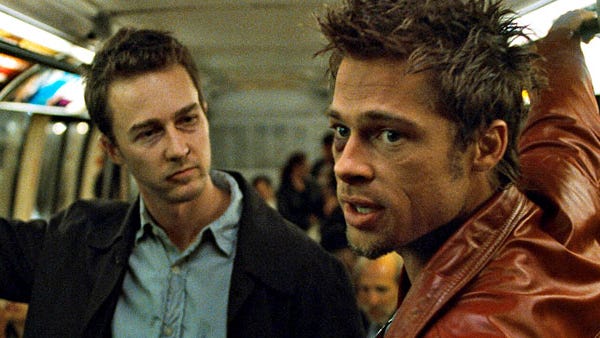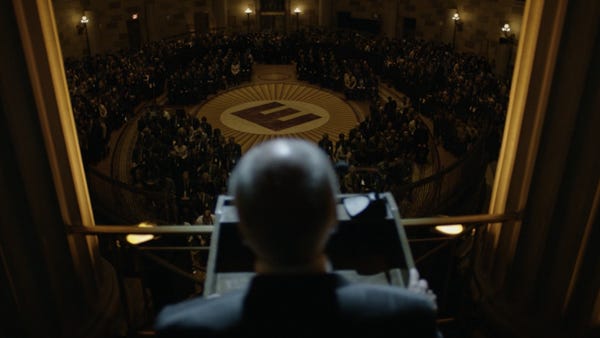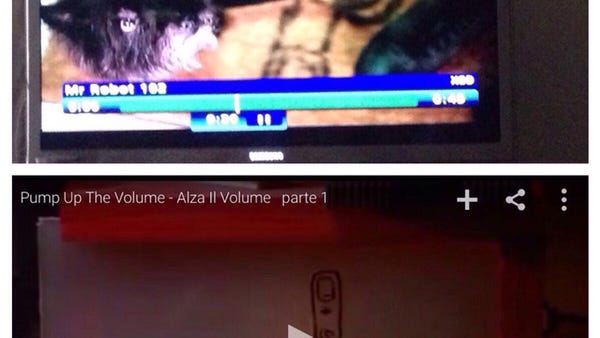Join or Sign In
Sign in to customize your TV listings
By joining TV Guide, you agree to our Terms of Use and acknowledge the data practices in our Privacy Policy.
Mr. Robot: 9 Obvious and Not-So-Obvious Movie Influences
There's more to Mr. Robot's influences than Fight Club
If you think USA's Mr. Robot looks unlike anything you've seen on television, it's because it looks an awful lot like things you've seen in movies. Creator Sam Esmail has not been shy about hiding the fact that cinema has influenced many of his choices in the show, from the storyline, to the cinematography, to the presentation, and it doesn't take a film major to spot them in each episode.
We've put together a list of some of the more interesting film references, homages and influences that make Mr. Robot the show it is. Take a look, and share any others in the comments.
1. Fight Club (1999)

We'll start with the obvious one first. The one so obvious that if you missed it, then you probably have never watched Fight Club and should download it from the dark web and get that taken care of right now. Mr. Robot borrows (or steals, depending on your vantage point) so much from David Fincher's Fight Club that it's almost a crime, from the Tyler Durden-esque reveal that Mr. Robot (Christian Slater) was Elliot (Rami Malek) all along to the piano-fied version of The Pixies' "Where Is My Mind?" as mega-corporations are toppled. From the opening moments to the final scene, Mr. Robot is a loving homage (or blatant rip-off) of a generation's classic.
2. Every Stanley Kubrick movie (various, 1964-1999)

One of the greatest directors of our time has a clear influence on Esmail, and given how ahead of his time Kubrick was, that's totally OK! Mr. Robot's shot composition is straight out of Kubrick's filming manual and many of his films are indirectly referenced through its presentation. Esmail says the Mr. Robot title card was influenced by A Clockwork Orange, a steady shot on a camera's red light as an Evil Corp exec commits suicide lifts from 2001: A Space Odyssey, and Evil Corp CEO Philip Price's (Michael Cristofer) addressing of his company looks like something out of a secret orgy scene in Eyes Wide Shut. Hey, if you're going to borrow ideas, you may as well borrow from the best.
3. Hackers (1995)

The campy mid-'90s film about underground computer hackers was one of the entertainment industry's first looks at this niche group, and it was utterly stupid. Hackers was almost an anti-influence for Esmail, in that its over-stylized look at computer hacking was to be avoided at all costs in Mr. Robot, which led to the series' phenomenally accurate portrayal of how a hack actually goes down. Plus, Hackers was directly referenced by fsociety members Mobley (Azhar Khan) and Romero (Ron Cephas Jones) while they were en route to Steel Mountain. "Hollywood hacker bullsh--," Romero said, while watching the film. "I've been doing this for 20 years and not once have I run into an animated, singing virus." And then added, "I bet you right now some writer is working hard on a TV show that will mess up this generation's idea of hacker culture." Yep!
4. Vanilla Sky (2001)
Do you remember that scene when Tom Cruise was running around an empty Times Square in Vanilla Sky? Mr. Robot remembers.
5. American Psycho (2000)

Mary Harron's American Psycho, adapted from the Bret Easton Ellis novel, looked at corporate culture with a sharpened axe, something clearly reproduced in Mr. Robot. All you have to do is take one look at Tyrell Wellick (Martin Wallstrom) in his sharp suit and slicked hair to get Patrick Bateman vibes from him. Both share a sociopathic drive to get ahead in their jobs to the point of murder, and I'd be willing to bet that there's a Huey Lewis and The News disc in the CD player of Tyrell's SUV.
6. Trainspotting (1996)

Elliot's withdrawal from morphine went totally cuckoo bananas, but before Elliot tripped out about his old home and walking into a crackhouse, he quivered and squirmed on a bed just like Renton did in Trainspotting. Elliot's anarchist voiceover is also reminiscent of Renton's anti-establishment internal monologue too.
7. Risky Business (1983)

Music is a huge part of Mr. Robot, and Tangerine Dream's mesmerizing "Love on a Real Train," originally featured on the Risky Business soundtrack, dominates the fantastic end of "Exploits" and it's impossible not to think of the star-making vehicle for Tom Cruise. In Risky Business, the tune is played during a hot love-making session between Tom Cruise and Rebecca De Mornay while they're on a train. On Mr. Robot, it's played while Elliot and Darlene are on a train (sans lovemaking because GROSS), but also when Angela (Portia Doubleday) goes on one of those angry runs to release some frustration after finding out her dad is in deep debt. Sure, Angela isn't planning any parties while her daddy is out of town, but the idea of making choices and engaging in, ahem, risky business, is front and center. While jogging through the 'burbs -- a neighborhood very much like the one Cruise lived in -- Angela comes upon a fork in the road while the song plays, and it's a pivotal moment for her and one that may have led her to joining Evil Corp. Thematically, Risky Business was all about making big decisions at a critical point in your life, and that's what happened here in Mr. Robot.
8. Pump Up the Volume (1990)

Leave it to the internet to pick up on the slightest of references! A Reddit user correctly identified a familiar image -- that of an extended middle finger -- from the pirate-radio film Pump Up the Volume and Mr. Robot, and another film reference was born. And of course the star of Pump Up the Volume was... Christian Slater.
9. The Third Man (1949)
You know where an odd place to film a scene is? In a Ferris wheel. But the memorable chat from the pilot between Mr. Robot and Elliot on Coney Island in one of those circular death traps wasn't the first time that happened. The British noir drama The Third Man shot one of its most famous scenes in a Ferris wheel, with dialogue that harkened back to some of Mr. Robot's biggest themes of revolution coming out of a time of war and oppression.
